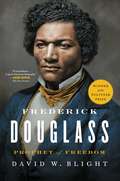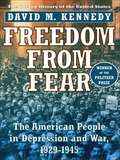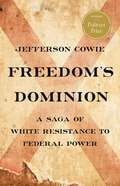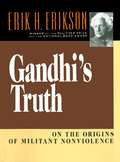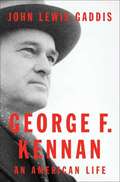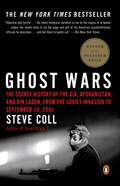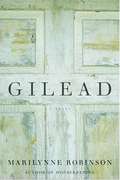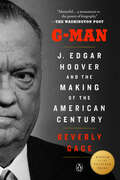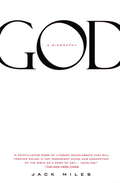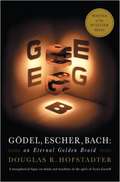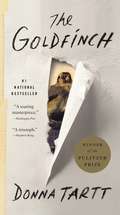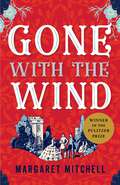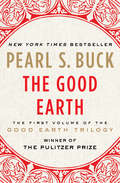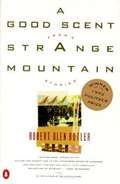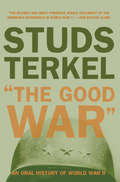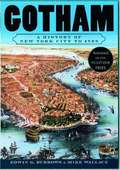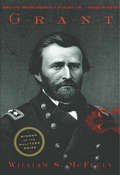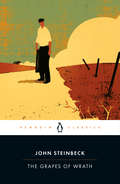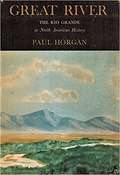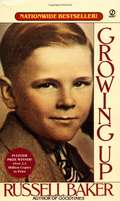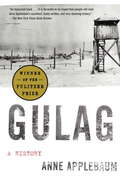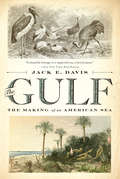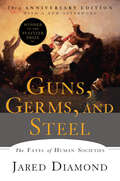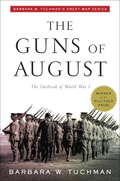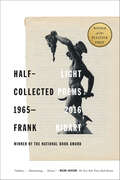Special Collections
Pulitzer Prize Award Winners
Description: Bookshare is pleased to offer the following titles, winners of the Pulitzer Prize Award. Note: Some drama winners are available and are listed under Fiction awards. #award
- Table View
- List View
Frederick Douglass
by David W. Blight**Winner of the Pulitzer Prize in History** &“Extraordinary…a great American biography&” (The New Yorker) of the most important African-American of the nineteenth century: Frederick Douglass, the escaped slave who became the greatest orator of his day and one of the leading abolitionists and writers of the era.As a young man Frederick Douglass (1818–1895) escaped from slavery in Baltimore, Maryland. He was fortunate to have been taught to read by his slave owner mistress, and he would go on to become one of the major literary figures of his time. His very existence gave the lie to slave owners: with dignity and great intelligence he bore witness to the brutality of slavery. Initially mentored by William Lloyd Garrison, Douglass spoke widely, using his own story to condemn slavery. By the Civil War, Douglass had become the most famed and widely travelled orator in the nation. In his unique and eloquent voice, written and spoken, Douglass was a fierce critic of the United States as well as a radical patriot. After the war he sometimes argued politically with younger African Americans, but he never forsook either the Republican party or the cause of black civil and political rights. In this &“cinematic and deeply engaging&” (The New York Times Book Review) biography, David Blight has drawn on new information held in a private collection that few other historian have consulted, as well as recently discovered issues of Douglass&’s newspapers. &“Absorbing and even moving…a brilliant book that speaks to our own time as well as Douglass&’s&” (The Wall Street Journal), Blight&’s biography tells the fascinating story of Douglass&’s two marriages and his complex extended family. &“David Blight has written the definitive biography of Frederick Douglass…a powerful portrait of one of the most important American voices of the nineteenth century&” (The Boston Globe). In addition to the Pulitzer Prize, Frederick Douglass won the Bancroft, Parkman, Los Angeles Times (biography), Lincoln, Plutarch, and Christopher awards and was named one of the Best Books of 2018 by The New York Times Book Review, The Wall Street Journal, The Boston Globe, The Chicago Tribune, The San Francisco Chronicle, and Time.
Freedom From Fear
by David M. KennedyAmerica During the Depression and World War II.
Pulitzer Prize Winner
Freedom’s Dominion (Winner of the Pulitzer Prize)
by Jefferson CowieWINNER OF THE PULITZER PRIZE IN HISTORYAn "important, deeply affecting—and regrettably relevant" (New York Times) chronicle of a sinister idea of freedom: white Americans&’ freedom to oppress others and their fight against the government that got in their way. American freedom is typically associated with the fight of the oppressed for a better world. But for centuries, whenever the federal government intervened on behalf of nonwhite people, many white Americans fought back in the name of freedom—their freedom to dominate others. In Freedom&’s Dominion, historian Jefferson Cowie traces this complex saga by focusing on a quintessentially American place: Barbour County, Alabama, the ancestral home of political firebrand George Wallace. In a land shaped by settler colonialism and chattel slavery, white people weaponized freedom to seize Native lands, champion secession, overthrow Reconstruction, question the New Deal, and fight against the civil rights movement. A riveting history of the long-running clash between white people and federal authority, this book radically shifts our understanding of what freedom means in America.
Gandhi's Truth
by Erik H. EriksonIn this study of Mahatma Gandhi, psychoanalyst Erik H. Erikson explores how Gandhi succeeded in mobilizing the Indian people both spiritually and politically as he became the revolutionary innovator of militant non-violence and India became the motherland of large-scale civil disobedience.
Winner of the National Book Award
Pulitzer Prize Winner
George F. Kennan
by John Lewis GaddisSelected by The New York Times Book Review as a Notable Book of the Year. Drawing on extensive interviews with George Kennan and exclusive access to his archives, an eminent scholar of the Cold War delivers a revelatory biography of its troubled mastermind. In the late 1940s, George Kennan wrote two documents, the "Long Telegram" and the "X Article," which set forward the strategy of containment that would define U.S. policy toward the Soviet Union for the next four decades. This achievement alone would qualify him as the most influential American diplomat of the Cold War era. But he was also an architect of the Marshall Plan, a prizewinning historian, and would become one of the most outspoken critics of American diplomacy, politics, and culture during the last half of the twentieth century. Now the full scope of Kennan's long life and vast influence is revealed by one of today's most important Cold War scholars. Yale historian John Lewis Gaddis began this magisterial history almost thirty years ago, interviewing Kennan frequently and gaining complete access to his voluminous diaries and other personal papers. So frank and detailed were these materials that Kennan and Gaddis agreed that the book would not appear until after Kennan's death. It was well worth the wait: the journals give this book a breathtaking candor and intimacy that match its century-long sweep. We see Kennan's insecurity as a Midwesterner among elites at Princeton, his budding dissatisfaction with authority and the status quo, his struggles with depression, his gift for satire, and his sharp insights on the policies and people he encountered. Kennan turned these sharp analytical gifts upon himself, even to the point of regularly recording dreams. The result is a remarkably revealing view of how this greatest of Cold War strategists came to doubt his strategy and always doubted himself. This is a landmark work of history and biography that reveals the vast influence and rich inner landscape of a life that both mirrored and shaped the century it spanned.
Pulitzer Prize winner
Ghost Wars
by Steve CollWinner of the 2005 Pulitzer PrizeThe explosive first-hand account of America's secret history in AfghanistanWith the publication of Ghost Wars, Steve Coll became not only a Pulitzer Prize winner, but also the expert on the rise of the Taliban, the emergence of Bin Laden, and the secret efforts by CIA officers and their agents to capture or kill Bin Laden in Afghanistan after 1998.
Gilead
by Marilynne RobinsonIn 1956, toward the end of Reverend John Ames's life, he begins a letter to his young son, an account of himself and his forebears. Ames is the son of an Iowan preacher and the grandson of a minister who, as a young man in Maine, saw a vision of Christ bound in chains and came west to Kansas to fight for abolition: He "preached men into the Civil War," then, at age fifty, became a chaplain in the Union Army, losing his right eye in battle.
Reverend Ames writes to his son about the tension between his father--an ardent pacifist--and his grandfather, whose pistol and bloody shirts, concealed in an army blanket, may be relics from the fight between the abolitionists and those settlers who wanted to vote Kansas into the union as a slave state. And he tells a story of the sacred bonds between fathers and sons, which are tested in his tender and strained relationship with his namesake, John Ames Boughton, his best friend's wayward son.
This is also the tale of another remarkable vision--not a corporeal vision of God but the vision of life as a wondrously strange creation. It tells how wisdom was forged in Ames's soul during his solitary life, and how history lives through generations, pervasively present even when betrayed and forgotten.
Pulitzer Prize Winner
G-Man (Pulitzer Prize Winner)
by Beverly GageWinner of the 2023 Pulitzer Prize in BiographyWinner of the 2022 National Book Critics Circle Award in Biography, the 2023 Bancroft Prize in American History and Diplomacy, and the 43rd LA Times Book Prize in Biography | Finalist for the 2023 PEN/Jacqueline Bograd Weld Award for BiographyNamed a Best Book of 2022 by The Atlantic, The Washington Post and Smithsonian Magazine and a New York Times Top 100 Notable Books of 2022 &“Masterful…This book is an enduring, formidable accomplishment, a monument to the power of biography [that] now becomes the definitive work&”—The Washington Post&“A nuanced portrait in a league with the best of Ron Chernow and David McCullough.&”—The Wall Street JournalA major new biography of J Edgar Hoover that draws from never-before-seen sources to create a groundbreaking portrait of a colossus who dominated half a century of American history and planted the seeds for much of today's conservative political landscape.We remember him as a bulldog--squat frame, bulging wide-set eyes, fearsome jowls--but in 1924, when he became director of the FBI, he had been the trim, dazzling wunderkind of the administrative state, buzzing with energy and big ideas for reform. He transformed a failing law-enforcement backwater, riddled with scandal, into a modern machine. He believed in the power of the federal government to do great things for the nation and its citizens. He also believed that certain people--many of them communists or racial minorities or both-- did not deserve to be included in that American project. Hoover rose to power and then stayed there, decade after decade, using the tools of state to create a personal fiefdom unrivaled in U.S. history. Beverly Gage&’s monumental work explores the full sweep of Hoover&’s life and career, from his birth in 1895 to a modest Washington civil-service family through his death in 1972. In her nuanced and definitive portrait, Gage shows how Hoover was more than a one-dimensional tyrant and schemer who strong-armed the rest of the country into submission. As FBI director from 1924 through his death in 1972, he was a confidant, counselor, and adversary to eight U.S. presidents, four Republicans and four Democrats. Franklin Roosevelt and Lyndon Johnson did the most to empower him, yet his closest friend among the eight was fellow anticommunist warrior Richard Nixon. Hoover was not above blackmail and intimidation, but he also embodied conservative values ranging from anticommunism to white supremacy to a crusading and politicized interpretation of Christianity. This garnered him the admiration of millions of Americans. He stayed in office for so long because many people, from the highest reaches of government down to the grassroots, wanted him there and supported what he was doing, thus creating the template that the political right has followed to transform its party.G-Man places Hoover back where he once stood in American political history--not at the fringes, but at the center--and uses his story to explain the trajectories of governance, policing, race, ideology, political culture, and federal power as they evolved over the course of the 20th century.
God
by Jack MilesWhat sort of "person" is God? Is it possible to approach him not as an object of religious reverence, but as the protagonist of the world's greatest book--as a character who possesses all the depths, contradictions, and abiguities of a Hamlet? In this "brilliant, audacious book" (Chicago Tribune), a former Jesuit marshalls a vast array of learning and knowledge of the Hebrew Bible to illuminate God--and man--with a sense of discovery and wonder.
Pulitzer Prize Winner
Gödel, Escher, Bach
by Douglas R. HofstadterThis groundbreaking Pulitzer Prize-winning book sets the standard for interdisciplinary writing, exploring the patterns and symbols in the thinking of mathematician Kurt Gödel, artist M.C. Escher, and composer Johann Sebastian Bach.
Winner of the National Book Award
Pulitzer Prize Winner
The Goldfinch
by Donna TarttTheo Decker, a 13-year-old New Yorker, miraculously survives an accident that kills his mother.
Abandoned by his father, Theo is taken in by the family of a wealthy friend.
Bewildered by his strange new home on Park Avenue, disturbed by schoolmates who don't know how to talk to him, and tormented above all by his longing for his mother, he clings to the one thing that reminds him of her: a small, mysteriously captivating painting that ultimately draws Theo into the underworld of art.
As an adult, Theo moves silkily between the drawing rooms of the rich and the dusty labyrinth of an antiques store where he works. He is alienated and in love--and at the center of a narrowing, ever more dangerous circle.
The Goldfinch is a mesmerizing, stay-up-all-night and tell-all-your-friends triumph, an old-fashioned story of loss and obsession, survival and self-invention, and the ruthless machinations of fate.
Winner of the Pulitzer Prize
Gone with the Wind
by Margaret MitchellSince its original publication in 1936, Gone With the Wind—winner of the Pulitzer Prize and one of the bestselling novels of all time—has been heralded by readers everywhere as The Great American Novel.Widely considered The Great American Novel, and often remembered for its epic film version, Gone With the Wind explores the depth of human passions with an intensity as bold as its setting in the red hills of Georgia. A superb piece of storytelling, it vividly depicts the drama of the Civil War and Reconstruction. This is the tale of Scarlett O’Hara, the spoiled, manipulative daughter of a wealthy plantation owner, who arrives at young womanhood just in time to see the Civil War forever change her way of life. A sweeping story of tangled passion and courage, in the pages of Gone With the Wind, Margaret Mitchell brings to life the unforgettable characters that have captured readers for over seventy years.
The Good Earth
by Pearl S. BuckThe Pulitzer Prize–winning, New York Times–bestselling novel about a peasant farmer and his family in early twentieth-century China.The Good Earth is Buck&’s classic story of Wang Lung, a Chinese peasant farmer, and his wife, O-lan, a former slave. With luck and hard work, the couple&’s fortunes improve over the years: They have sons, and save steadily until one day they can afford to buy property in the House of Wang—the very house in which O-lan used to work. But success brings with it a new set of problems. Wang soon finds himself the target of jealousy, and as good harvests come and go, so does the social order. Will Wang&’s family cherish the estate after he&’s gone? And can his material success, the bedrock of his life, guarantee anything about his soul? Winner of the Pulitzer Prize and the William Dean Howells Award, The Good Earth was an Oprah&’s Book Club choice in 2004. A readers&’ favorite for generations, this powerful and beautifully written fable resonates with universal themes of hope and family unity. This ebook features an illustrated biography of Pearl S. Buck including rare images from the author&’s estate.
A Good Scent from a Strange Mountain
by Robert Olen ButlerA collection of stories by the author of The Deuce, Wabash, The Alleys of Eden, and On Distant Ground features tales of the residents of Saigon as they face love, loss, despair, and more.
Pulitzer Prize Winner
"The Good War"
by Studs TerkelWinner of the Pulitzer Prize: &“The richest and most powerful single document of the American experience in World War II&” (The Boston Globe). &“The Good War&” is a testament not only to the experience of war but to the extraordinary skill of Studs Terkel as an interviewer and oral historian. From a pipe fitter&’s apprentice at Pearl Harbor to a crew member of the flight that dropped the atomic bomb on Nagasaki, his subjects are open and unrelenting in their analyses of themselves and their experiences, producing what People magazine has called &“a splendid epic history&” of WWII. With this volume Terkel expanded his scope to the global and the historical, and the result is a masterpiece of oral history. &“Tremendously compelling, somehow dramatic and intimate at the same time, as if one has stumbled on private accounts in letters locked in attic trunks . . . In terms of plain human interest, Mr. Terkel may well have put together the most vivid collection of World War II sketches ever gathered between covers.&” —The New York Times Book Review &“I promise you will remember your war years, if you were alive then, with extraordinary vividness as you go through Studs Terkel&’s book. Or, if you are too young to remember, this is the best place to get a sense of what people were feeling.&” —Chicago Tribune &“A powerful book, repeatedly moving and profoundly disturbing.&” —People
Grant
by William S. McfeelyIn this stunning biography, William McFeely brings us a thoroughly compelling story of a tangled life.
Having once said "a military life had no charms to me," U.S. Grant entered West Point to get through the course, secure a detail for a few years as assistant professor of mathematics at the Academy, and afterwards obtain a permanent position as professor at some respectable college. But the course his life took was quite different. Little did he ever dream that he would serve with distinction in the Mexican War, lead the Union to victory in the Civil War, struggle through eight years as President of the United States, and wage bitter personal battles against alcoholism, insolvency, and cancer.
Pulitzer Prize Winner
The Grapes of Wrath
by John Steinbeck and Robert DemottThe Pulitzer Prize-winning epic of the Great Depression, a book that galvanized--and sometimes outraged--millions of readers.
First published in 1939, Steinbeck's Pulitzer Prize-winning epic of the Great Depression chronicles the Dust Bowl migration of the 1930s and tells the story of one Oklahoma farm family, the Joads-driven from their homestead and forced to travel west to the promised land of California. Out of their trials and their repeated collisions against the hard realities of an America divided into Haves and Have-Nots evolves a drama that is intensely human yet majestic in its scale and moral vision, elemental yet plainspoken, tragic but ultimately stirring in its human dignity.
A portrait of the conflict between the powerful and the powerless, of one man's fierce reaction to injustice, and of one woman's stoical strength, the novel captures the horrors of the Great Depression and probes into the very nature of equality and justice in America.
The Grapes of Wrath summed up its era in the way that Uncle Tom's Cabin summed up the years of slavery before the Civil War. Sensitive to fascist and communist criticism, Steinbeck insisted that "The Battle Hymn of the Republic" be printed in its entirety in the first edition of the book--which takes its title from the first verse: "He is trampling out the vintage where the grapes of wrath are stored." At once a naturalistic epic, captivity narrative, road novel, and transcendental gospel, Steinbeck's powerful landmark novel is perhaps the most American of American Classics.
This edition contains an introduction and notes by Steinbeck scholar Robert Demott.
Great River
by Paul HorganWith the skill of a novelist, and the love of a long-time resident, Paul Horgan describes the Rio Grande, its role in human history, and the overlapping cultures that have grown up alongside it or entered into conflict over the land it traverses.
Pulitzer Prize Winner
Growing Up
by Russell BakerThe Pulitzer Prize–winning memoir about coming of age in America between the world wars: &“So warm, so likable and so disarmingly funny&” (The New York Times). One of the New York Times&’ &“50 Best Memoirs of the Past 50 Years&” Ranging from the backwoods of Virginia to a New Jersey commuter town to the city of Baltimore, this remarkable memoir recounts Russell Baker&’s experience of growing up in pre–World War II America, before he went on to a celebrated career in journalism. With poignant, humorous tales of powerful love, awkward sex, and courage in the face of adversity, Baker reveals how he helped his mother and family through the Great Depression by delivering papers and hustling subscriptions to the Saturday Evening Post—a job which introduced him to bullies, mentors, and heroes who endured this national disaster with hard work and good cheer. Called &“a treasure&” by Anne Tyler and &“a blessing&” by Time magazine, this autobiography is a modern-day classic—&“a wondrous book [with scenes] as funny and touching as Mark Twain&’s&” (Los Angeles Times Book Review). &“In lovely, haunting prose, he has told a story that is deeply in the American grain.&” —The Washington Post Book World &“A terrific book.&” —St. Louis Post-Dispatch
Gulag
by Anne ApplebaumPULITZER PRIZE WINNER • This magisterial and acclaimed history offers the first fully documented portrait of the Gulag, from its origins in the Russian Revolution, through its expansion under Stalin, to its collapse in the era of glasnost.&“A tragic testimony to how evil ideologically inspired dictatorships can be.&” –The New York Times The Gulag—a vast array of Soviet concentration camps that held millions of political and criminal prisoners—was a system of repression and punishment that terrorized the entire society, embodying the worst tendencies of Soviet communism. Applebaum intimately re-creates what life was like in the camps and links them to the larger history of the Soviet Union. Immediately recognized as a landmark and long-overdue work of scholarship, Gulag is an essential book for anyone who wishes to understand the history of the twentieth century.
The Gulf
by Jack E. DavisThe tragic collision between civilization and nature in the Gulf of Mexico becomes a uniquely American story in this environmental epic.
When painter Winslow Homer first sailed into the Gulf of Mexico, he was struck by its "special kind of providence." Indeed, the Gulf presented itself as America’s sea—bound by geography, culture, and tradition to the national experience—and yet, there has never been a comprehensive history of the Gulf until now. And so, in this rich and original work that explores the Gulf through our human connection with the sea, environmental historian Jack E. Davis finally places this exceptional region into the American mythos in a sweeping history that extends from the Pleistocene age to the twenty-first century.
Significant beyond tragic oil spills and hurricanes, the Gulf has historically been one of the world's most bounteous marine environments, supporting human life for millennia. Davis starts from the premise that nature lies at the center of human existence, and takes readers on a compelling and, at times, wrenching journey from the Florida Keys to the Texas Rio Grande, along marshy shorelines and majestic estuarine bays, profoundly beautiful and life-giving, though fated to exploitation by esurient oil men and real-estate developers.
Rich in vivid, previously untold stories, The Gulf tells the larger narrative of the American Sea—from the sportfish that brought the earliest tourists to Gulf shores to Hollywood’s engagement with the first offshore oil wells—as it inspired and empowered, sometimes to its own detriment, the ethnically diverse groups of a growing nation. Davis' pageant of historical characters is vast, including: the presidents who directed western expansion toward its shores, the New England fishers who introduced their own distinct skills to the region, and the industries and big agriculture that sent their contamination downstream into the estuarine wonderland. Nor does Davis neglect the colorfully idiosyncratic individuals: the Tabasco king who devoted his life to wildlife conservation, the Texas shrimper who gave hers to clean water and public health, as well as the New York architect who hooked the “big one” that set the sportfishing world on fire.
Ultimately, Davis reminds us that amidst the ruin, beauty awaits its return, as the Gulf is, and has always been, an ongoing story. Sensitive to the imminent effects of climate change, and to the difficult task of rectifying grievous assaults of recent centuries, The Gulf suggests how a penetrating examination of a single region's history can inform the country's path ahead.
Winner of the 2018 Pulitzer Prize for History
Guns, Germs, and Steel
by Jared DiamondIn this book, Jared Diamond convincingly argues that geographical and environmental factors shaped the modern world. Societies that had had a head start in food production advanced beyond the hunter-gatherer stage, and then developed religion --as well as nasty germs and potent weapons of war --and adventured on sea and land to conquer and decimate preliterate cultures. A major advance in our understanding of human societies, Guns, Germs, and Steel chronicles the way that the modern world came to be and stunningly dismantles racially based theories of human history.
Winner of the Pulitzer Prize, the Phi Beta Kappa Award in Science, the Rhone-Poulenc Prize, and the Commonwealth club of California's Gold Medal.
The Guns of August
by Barbara W. TuchmanIn this landmark account, renowned historian Barbara W. Tuchman re-creates the first month of World War I: thirty days in the summer of 1914 that determined the course of the conflict, the century, and ultimately our present world. Beginning with the funeral of Edward VII, Tuchman traces each step that led to the inevitable clash. And inevitable it was, with all sides plotting their war for a generation. Dizzyingly comprehensive and spectacularly portrayed with her famous talent for evoking the characters of the war’s key players, Tuchman’s magnum opus is a classic for the ages.
Pulitzer Prize Winner
Half-Light
by Frank BidartGathered together, the poems of Frank Bidart perform one of the most remarkable transmutations of the body into language in contemporary literature. His pages represent the human voice in all its extreme registers, whether it’s that of the child-murderer Herbert White, the obsessive anorexic Ellen West, the tormented genius Vaslav Nijinsky, or the poet’s own.
Winner of the 2018 Pulitzer Prize for Poetry
